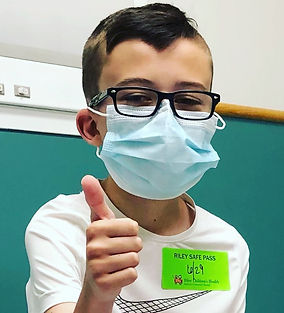What's Crohn's Disease?
Crohn's disease is a chronic (long-lasting) disease that causes inflammation in your digestive tract. It can affect any part of your digestive tract, which runs from your mouth to your anus, but usually affects your small intestine and the beginning of your large intestine. Crohn's disease is an Inflammatory Bowel Disease (IBD). It often gets confused with Irritable Bowel Syndrome (IBS). While Crohn’s disease and IBS both affect the GI tract, key differences exist including complications, causes, symptoms, and treatment.
Crohn’s disease and UC can cause chronic inflammation. However, neither IBS nor IBD cause inflammation or damage to the GI tract. IBD inflammation carries an increased risk of a person developing colorectal cancer, while IBS does not.
What causes Crohn's?
The cause of Crohn's disease is unknown. Researchers think that an autoimmune reaction may be one cause. An autoimmune reaction happens when your immune system attacks healthy cells in your body. Genetics may also play a role, since Crohn's disease can run in families.
How is Crohn's diagnosed?
To confirm a diagnosis of Crohn’s disease, a Gastroenterologist will perform blood tests and stool samples to detect the presence of inflammation. For example, they will check red and white blood cells and fecal calprotectin levels. Other procedures for Crohn’s disease include upper endoscopies, colonoscopies, CT scans, MRI scans, and biopsies to examine specific sections of the digestive tract and aid in the diagnosis. To make an accurate diagnosis of IBD, there has to be visible mucosal inflammation on the colonoscopy or imaging, as well as biomarkers, such as fetal calprotectin. IBS has no accepted biomarker or structural explanation of the mucosa seen on colonoscopy level for the symptoms.
Is Crohn's Disease Treated?
Yes! Anti-inflammatory drugs are often the first step in the treatment of inflammatory bowel disease. Immune System Suppressors are drugs that reduce inflammation but, since they target your immune system, can also cause inflammation. For some people, a combination of these drugs works better than one drug alone. Biologics are then used to target proteins made by the immune system. Biologics neutralize an immune system protein known as tumor necrosis factor (TNF). Antibiotics are used to reduce the amount of drainage from fistulas and abscesses to hopefully heal them. Some researchers also think that antibiotics help reduce harmful bacteria that may be causing inflammation in the intestine. Doctors use nutrition therapy short term and combine it with medications, such as immune system suppressors. Enteral and parenteral nutrition are typically used to make people healthier prior to surgery or when other medications fail to control symptoms. If diet and lifestyle changes, drug therapy, or other treatments don't relieve your signs and symptoms, your doctor may recommend surgery. Nearly half of those with Crohn's disease will require at least one surgery. However, surgery does not cure Crohn's disease.
Advocacy for Crohn's disease is important to improve the quality of life for patients and their families, and to find a cure. Ty Arbogast lives with Crohn's Disease and he advocates for it every day.

Racing With Crohn's Founder Ty Arbogast, 11
What are symptoms of Crohn's Disease?
-
Diarrhea
-
Fever
-
Fatigue
-
Abdominal pain and severe cramping
-
Blood in your stool
-
Mouth sores
-
Reduced appetite
-
Fistula's
-
Inflammation of skin, eyes and joints
-
Inflammation of the liver or bile ducts
-
Kidney stones
-
Iron deficiency (anemia)
-
Delayed growth or sexual development, in children
-
Nausea and vomiting
-
Unexplained rapid weight loss
-
Brain fog

Where can I learn more?
-
Crohn's & Colitis Foundation
Offers a variety of resources, including:
-
IBD Clinical Hub: Provides educational resources on Crohn's disease and ulcerative colitis, including information on diagnosis, treatment, and management. The hub also offers patient support tools and checklists.
-
MyIBD Learning: Provides education programs for patients and caregivers, including in-person, virtual, and on-demand options. These programs offer information on the latest research, treatments, and therapies for inflammatory bowel disease (IBD).
-
IBD & Me Activity Center: Offers comics and games for kids and parents to learn about Crohn's disease and ulcerative colitis.
-
Information Specialists: Available by phone, email, or chat Monday through Friday, 9 AM–5 PM EST. Call (888) MY-GUT-PAIN, email INFO@CROHNSCOLITISFOUNDATION.ORG, or chat with a live agent.
-


